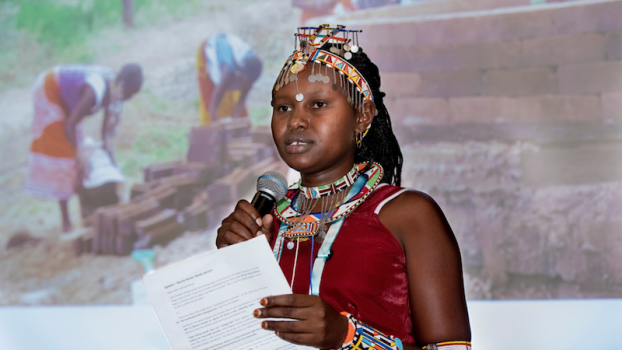The Ripple Effect: Supporting Women’s Empowerment through Water
New research demonstrates that improving a woman’s access to water, sanitation, and hygiene (WASH) provides a multitude of indirect and positive impacts that often are overlooked in traditional development interventions. Benefits of this water access “ripple effect” go beyond the time savings and health outcomes that are well known across the sector. Referred to as “pathways to empowerment,” these now-quantifiable impacts cover a range of outcomes, including a more than 50 percent increase in female community leadership positions and shifts in gender norms within the community.
In 2018, USAID’s long-running partnership with The Coca-Cola Company, the Water and Development Alliance (WADA), collaborated with global research firm Ipsos to explore the intersection of water and women’s empowerment. Referred to as the Ripple Effect Study, this research rigorously assessed the role of water in enabling women’s empowerment and promoting gender equality.
During a World Water Week showcase event in Stockholm in late August, WADA, USAID, The Coca-Cola Company, Women + Water Alliance, Gap Inc., and Global Water Challenge (GWC) shared the details of this research publicly for the first time.
USAID Acting Global Water Coordinator, James Peters provided opening remarks for the panel, stating that USAID focuses on three key concepts regarding women’s empowerment: “The use of metrics to assess the impacts of our efforts, the necessity to continue to collaborate with our friends in the private sector, and the absolute need to include all members of communities in their journey to self-reliance.” The research aligns with USAID’s Water and Development Plan as part of the U.S. Global Water Strategy, which provides more comprehensive metrics for improved monitoring, evaluation, and learning that will sharpen the Agency’s activities promoting the empowerment of women and girls.
Kaitlin Love, director of Public Affairs at Ipsos, provided an overview of the Ripple Effect Study findings. She highlighted the eight pathways to empowerment that can result from women’s improved access to water and sanitation. These pathways identified through the research represent the multi-dimensional ripple effects, or indirect impacts, that water access programming can provide to support women and their empowerment. The pathways include increases or improvements in women’s health, income, nutrition, safety and security, education, leadership and skills, time savings, and shifts in community roles and gender norms. A research hub including documentation can be seen here.
To highlight the role of research and evaluation in advancing gender equality, representatives from the World Bank, IHE Delft Institute for Water Education, Ipsos Public Affairs, and the Water Supply & Sanitation Collaborative Council joined a panel focused on research trends and priorities shaping the water sector’s gender equality and empowerment programming. Rolf Luyendijk, Executive Director of the Water Supply and Sanitation Collaborative Council, remarked on the importance of understanding the local context in cases where harmful practices--such as prohibiting girls from bathing or eating during menstruation--are accepted before deciding how to support empowerment of women and girls in that environment.
Further emphasizing the need to understand context, Jennifer Sara, Director of the Global Water Practice at the World Bank, explained that her organization does extensive analytical work to evaluate gender gaps prior to program design. Sara described the evidence that results from this analysis as a driver of policy decisions and gave several examples the World Bank has compiled around laws and regulations that limit opportunities for women. According to the dataset Women, Business and the Law, 2.7 billion women globally are legally restricted from having the same choice of jobs as men. In the case of WASH, this might be legal prohibitions against working as plumbers or divers. All panelists agreed that research and evaluation play a critical role in decision-making and programming, particularly when addressing issues as context-specific as gender equality and WASH.
Following the first panel, presenters from the “spotlight” portion of the session, Gretchen Steidle, founder and president of Global Grassroots, and Eliza Lesale, fellow at Young Water Solutions, both shared their unique experiences working towards women’s empowerment in communities across Africa. Gretchen remarked that “if you invest in women's leadership from the beginning (of an activity), you see women develop solutions that are aligned with the needs of the community. The community is then that much more deeply impacted by these solutions and vested in their success.”
Rounding out the session discussions, a panel of experts had a conversation about the role that public-private partnerships can play at the intersection of water and women’s empowerment. The panel included representatives from USAID; Ulrike Sapiro, Senior Director, Water Stewardship & Agriculture, The Coca-Cola Company; and Una Hrnjak-Hadziahmetovic, Senior Manager, Global Sustainability, Gap Inc. Ella Lazarte, USAID’s Senior WASH advisor, remarked that public private partnerships between USAID and companies like Coca-Cola and Gap Inc. are not just about unlocking financing, but about unlocking the unique solutions and inputs companies can provide, such as Gap Inc.’s P.A.C.E. program and Coca-Cola’s 5by20 initiative.
Neil Jeffery, chief executive, Water & Sanitation for the Urban Poor, closed the session with a call to action encouraging the promotion of women leaders across WASH institutions. “Leadership of women is fundamental in the institutions we work with - such as utilities, regulators, and municipalities - and their ability to achieve change is a critical part of improving delivery of services.”
A recording of the panel discussion can be viewed here. For more information on the Ripple Effect study see this infographic/factsheet and brochure.
By Drew Slattery, Communications Manager for the WADA Secretariat


